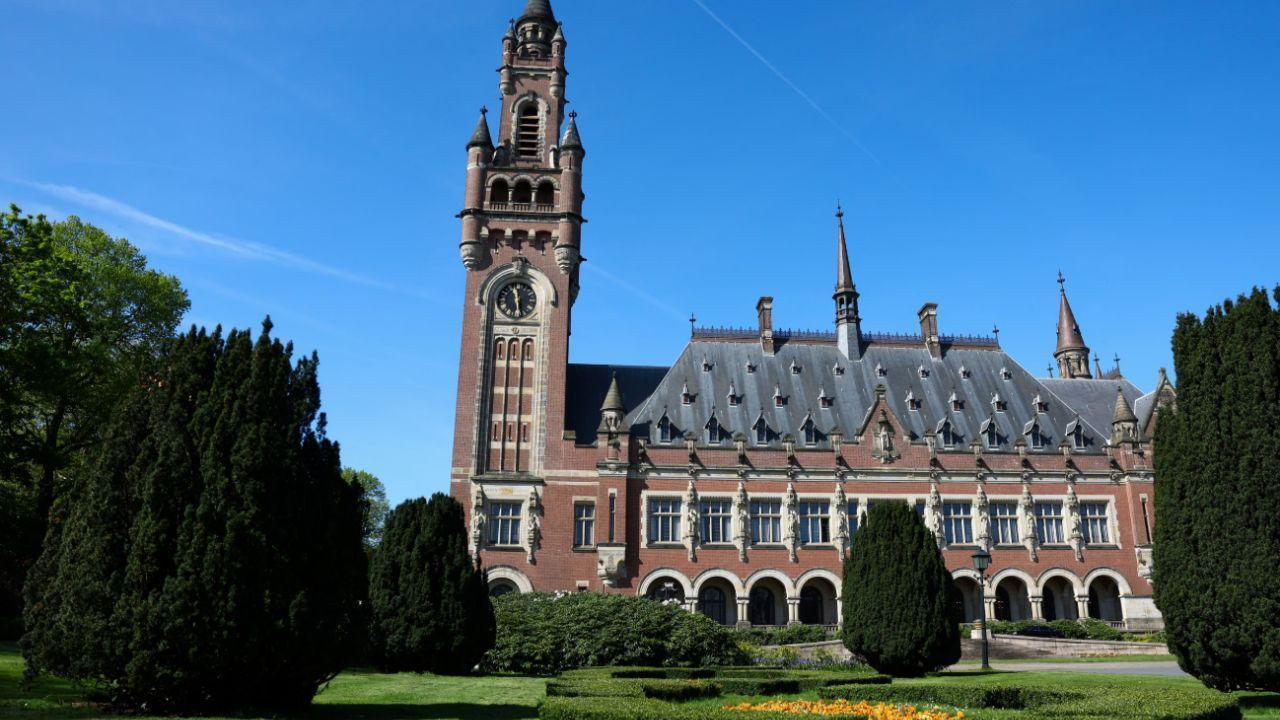
Post by : Priya
Photo:Reuters
On a day that may be remembered as a turning point in global climate justice, the International Court of Justice (ICJ) issued a powerful and unprecedented ruling: failing to act on climate change breaches international law.
The decision, delivered from the Peace Palace in The Hague, marks the first time the world’s top judicial body has made such a clear and binding statement about states’ responsibilities in the face of the climate crisis.
Requested by a group of small island nations already facing existential threats due to rising sea levels and extreme weather, the ruling sets a strong legal precedent. While it does not carry immediate enforcement power like a domestic court order, it lays the groundwork for future legal challenges, influencing governments, companies, and courts across the globe.
How the Case Reached the World Court
The story begins not in Europe, but in the South Pacific. Tiny island nations such as Vanuatu, Tuvalu, and the Maldives have for years called on the international community to take stronger action against climate change.
For these nations, global warming is not a distant threat. It’s a present-day emergency. Rising sea levels are swallowing shorelines. Saltwater intrusion is spoiling drinking water. Homes and livelihoods are being destroyed.
In 2021, under growing pressure from civil society and youth-led climate groups, the Vanuatu government began a campaign to bring the issue to the United Nations General Assembly. Their goal was simple but bold: ask the International Court of Justice to issue a legal opinion on whether governments were failing in their duties by not doing enough to stop climate change.
In 2023, the UN General Assembly voted overwhelmingly to support the request. A total of over 130 countries backed the resolution — showing just how widely the concern is shared.
Two years later, in 2025, the ICJ has now responded — and the message is clear: countries are legally bound to act on climate change.
What the Court Said: The Legal Summary in Simple Terms
The ICJ ruling says that states have obligations under international law to protect their citizens from the harm caused by climate change. This includes both preventing future damage and addressing current and past environmental harm.
The court based its opinion on existing legal texts, such as:
Customary international law
The court concluded that climate change poses serious threats to the right to life, the right to health, the right to food, and the right to clean water. It also emphasized that vulnerable populations — such as small island states, Indigenous peoples, children, and future generations — face the greatest risks.
Importantly, the court stated that countries must not only avoid causing environmental harm themselves but must also work together globally to limit temperature rises and transition away from fossil fuels.
Why This Decision Matters So Much
At first glance, some might ask: if this ruling has no penalties or legal punishments, why does it matter?
The answer lies in its symbolic and strategic power.
In short, this decision will echo in political discussions, legal documents, environmental treaties, and courtroom arguments for years to come.
The Voices Behind the Case: Small Nations, Big Impact
Countries like Vanuatu, Fiji, Barbados, and Palau may be small in size, but their efforts have reshaped international law.
Vanuatu’s Prime Minister, Ishmael Kalsakau, praised the ruling, calling it “a legal compass for climate justice.” In a speech to the UN shortly after the ICJ decision, he said:
“For too long, those of us suffering the most have been ignored. This ruling gives us hope. It is proof that our voices — no matter how small — can make the biggest difference.”
The Pacific Islands are on the frontlines of climate change. Sea-level rise threatens to wipe entire countries off the map within this century. For them, the court’s ruling is more than symbolic. It’s a lifeline — a legal shield they can now raise against the world’s biggest polluters.
Responses From Around the World
Reactions to the ruling have varied — from celebration in vulnerable countries to concern in fossil-fuel-rich nations.
European Union: Most EU nations welcomed the ruling, noting that it reinforces their own climate policies. European Commission President Ursula von der Leyen said the court’s message was “in line with EU climate goals.”
United States: The U.S. did not oppose the original case but has been cautious. A State Department spokesperson said the U.S. would “carefully review the opinion and continue to lead in climate action.”
China: China emphasized the need for “common but differentiated responsibilities,” echoing past calls for rich countries to lead the charge in emissions reductions.
India: India acknowledged the ruling but insisted that historical polluters must take the lead in cutting carbon emissions.
Petro-states: Countries like Saudi Arabia and Russia, who depend heavily on oil and gas exports, expressed concern that the ruling could lead to “politicized legal action” in future climate negotiations.
The Legal Future: More Court Cases Likely
Legal experts say this ruling could lead to a wave of climate lawsuits across the world.
Already, dozens of cases are underway in national courts where citizens are suing their governments over slow or weak climate policies. The ICJ ruling gives these efforts a major boost.
In Europe, youth groups in countries like Portugal, the Netherlands, and France have already taken their governments to court over climate inaction — some winning major victories.
In Latin America, courts in Colombia and Brazil have recognized the rights of nature and ordered stronger environmental protections.
Now, with the ICJ opinion in hand, activists and lawyers across Asia, Africa, and the Pacific may feel more confident bringing similar cases — demanding that governments respect the rights of their people and protect the environment.
The Global Climate Crisis: Context Behind the Ruling
This ruling comes at a time when the world is already feeling the harsh realities of climate change:
According to the Intergovernmental Panel on Climate Change (IPCC), the world has already warmed by 1.2°C since pre-industrial times, and is on track to breach the 1.5°C safety limit set by the Paris Agreement.
Without urgent action, scientists warn, we risk crossing dangerous tipping points — melting ice sheets, dying coral reefs, and collapsing ecosystems — that could cause irreversible harm.
The ICJ ruling arrives as a reminder that this crisis is not just scientific. It’s legal and human, too.
The Ethical Dimension: Rights of Future Generations
One of the most powerful aspects of the court’s ruling is its mention of future generations.
The ICJ recognized that climate inaction today could violate the rights of people who are not yet born. This is a huge step forward in legal thinking — and one that connects deeply with climate movements led by youth.
For groups like Fridays for Future, started by Greta Thunberg, this ruling is a legal echo of what young people have been shouting for years: “Our future is at stake.”
The court’s decision helps bring this idea into the heart of international law. It tells governments that their decisions must not only protect today’s citizens, but also respect the dignity of tomorrow’s world.
ICJ climate change ruling










Sinner & Swiatek Shine at China Open: Semifinal Spots Secured
Jannik Sinner and Iga Swiatek advance to the semifinals at the China Open. Read about their victori

Michigan church attack kills 4, injures 8 in shocking violence
A gunman drove into a Michigan church, fired shots, set fire, killing 4 and injuring 8 before police

Moldova’s Pro-EU Party Secures Majority in Key Vote
Moldova’s pro-European PAS wins a strong majority in the parliamentary election, weakening pro-Russi

Gabriel’s late header gives Arsenal 2-1 win at Newcastle
Arsenal snatch dramatic 2-1 win at Newcastle as Gabriel heads the winner in stoppage time; Merino eq

Air France Flight 447 Trial Opens 16 Years After Tragic Crash
Sixteen years after the Air France Flight 447 crash, a trial opens against Air France and Airbus. Le

Europe close to Ryder Cup win after strong weekend play
Team Europe is on the verge of winning the Ryder Cup, showing great form in Italy and needing only a